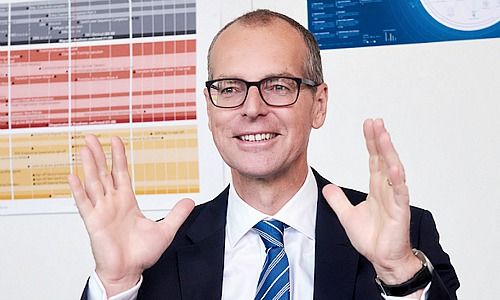I don't have a conclusive opinion on that. It's comparable to when automobiles superseded horse-drawn carriages. Yes, many coachmen lost their jobs, but found another one as a taxi driver. I think that as a bank we have to digitize our firm, just like any other industry does too. That will have a knock-on effect for employment, but I also believe these workers will be in demand for other jobs too.
That doesn't really sustainably lower costs, unless UBS is able to scale up volume.
Our primary focus is on generating growth, and digitization plays a key role here. In fact the biggest hurdle to us growing is personnel. Private bankers who can provide the level of quality service don't grow on trees. If you don't raise the level of productivity per advisors with digital helpers, analytical tools and more efficient processes, you have a growth problem.
UBS has catered to British retail clients for about a year now with a robo advisor, «Smartwealth» - a departure for a bank which primarily focuses on wealthy clientele.
It's a pilot project. Robo advisors were just beginning to emerge when I joined UBS four years ago. Instead of automatically viewing this technology as irrelevant for an advisor-driven private bank, we examined it. The technology will definitely establish itself – the question is just in what form.
How was Smartwealth's first year?
Robo advisory and digital wealth managers in general aren't a mass phenomenon yet. With UBS Smartwealth, we're just trying to be at the forefront of technological advancement, instead of leaving the area to fintechs. The same applies to any promising technology like blockchain or artificial intelligence. UBS sees itself as a tech firm.
What can Smartwealth do that other robo advisors can't?
It isn't a blueprint of American robo advisors Betterment or Wealthfront. Instead, users can develop very differentiated investment targets. For example: I want to buy a house in ten years. Or, I'd like to take early retirement. Smartwealth is a kind of financial planner.
And it mainly offers UBS products?
No. We only offer our own products – and this doesn't just apply for UBS Smartwealth – if we can demonstrate that they are as good or better than the competition. We call this «guided architecture,» unlike «open architecture,» which contains no own products at all.
Who decides on the products' merits?
An centrally-organized investment body within the bank.
Wouldn't it be better for UBS' credibility to delegate the product selection to outside of the bank?
We treat our own products exactly the same as outside ones, and evaluate them along various quantitative and qualitative criteria. If ours is as good or better, we take it. If not, we choose a third party's product.
Next year, the European Payment Services Directive, or PSD2, comes into force, which requires banks to open their API portals. Switzerland will eventually also have to comply with this. Is this a big threat for banks?




































